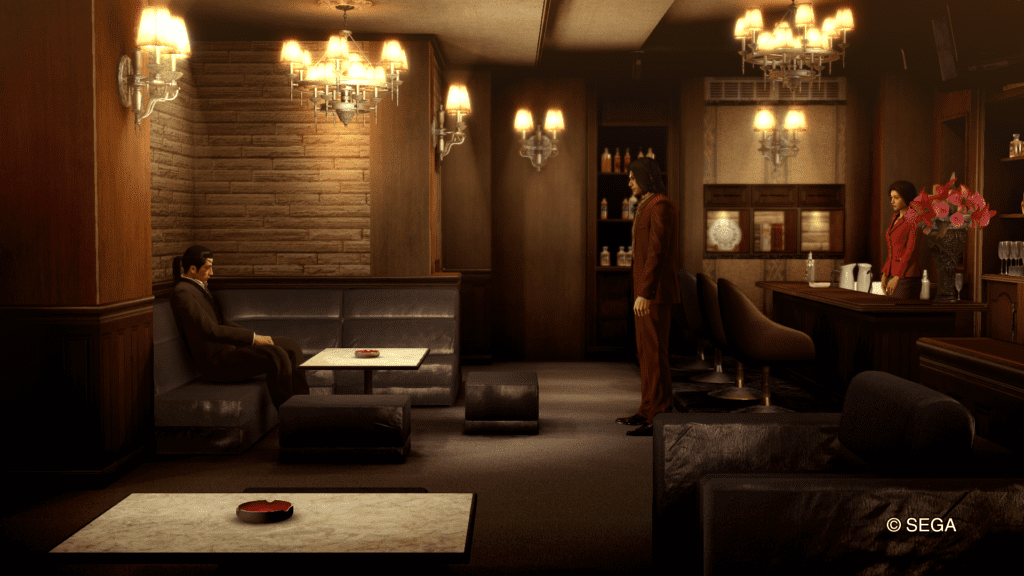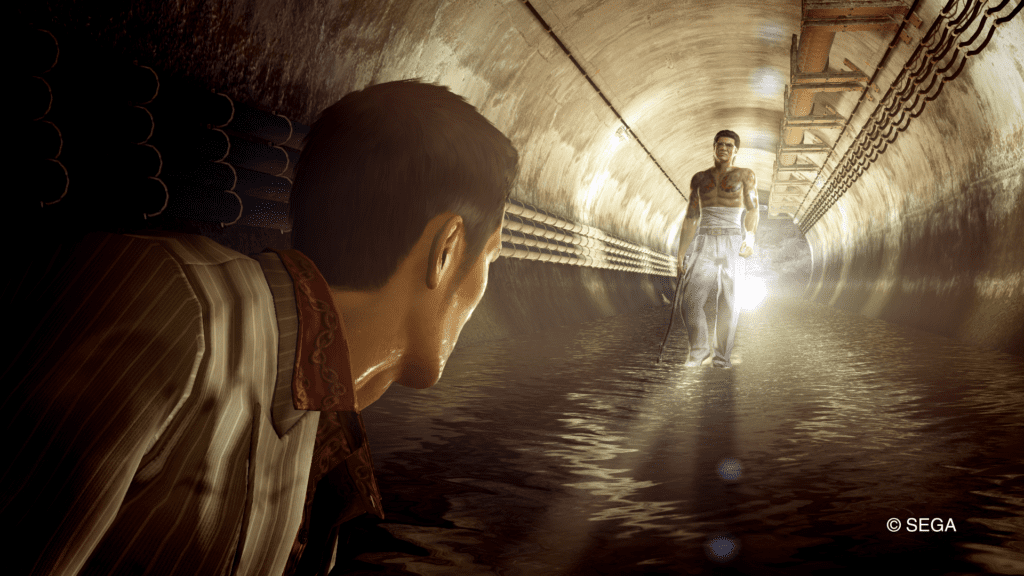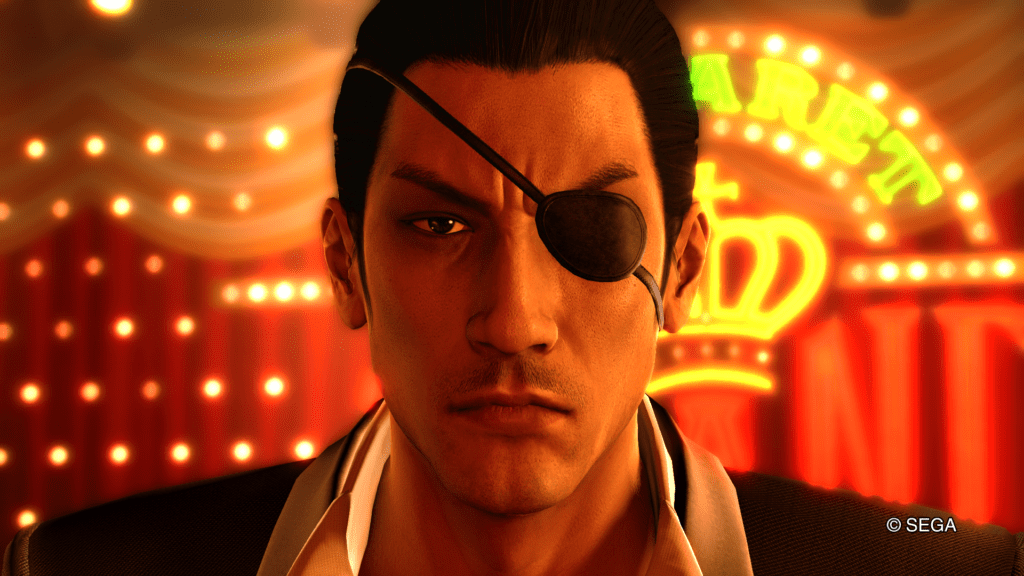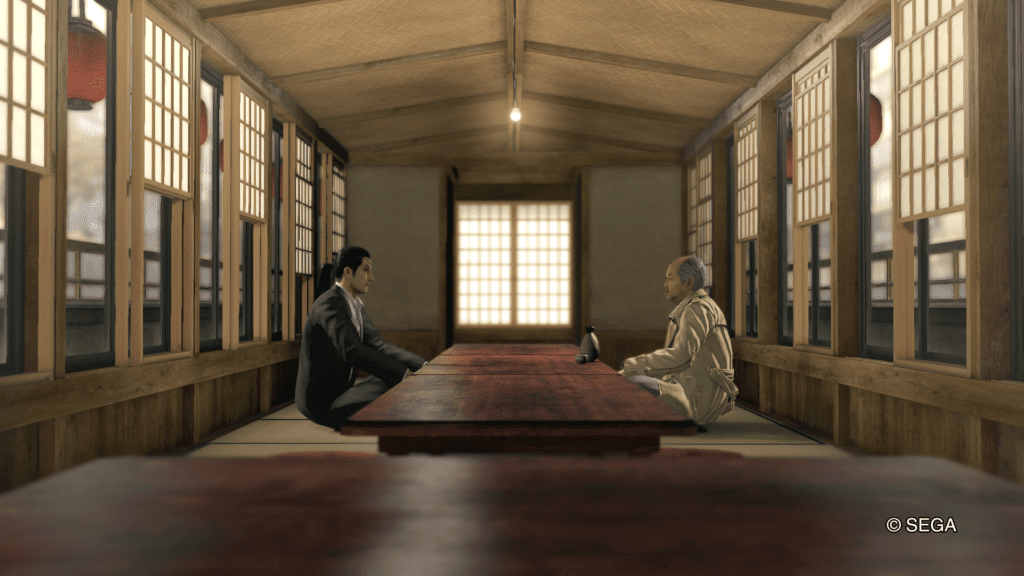Suffocated by the sickly orange glow that heralds the arrival of the midnight hour, the twin towns of Kamurocho and Sotenbori pulsate with the life and laughter of a populace enjoying the spoils of an economic boom. The rattling of arcade machines and shuffling of tokens beckons from behind the clouded screen doors of Pachinko parlours, the rhythmic bass emitting from the discotheque is felt before it’s heard, and the defeated karaoke crooners staggering drunkenly into the streets pack the sidewalks up until daybreak. Daily exercises in the art of avarice are surpassed only by the evenings accomplishments of burning it all at the free-flowing cabaret bar or remorseless roulette wheel. It’s a self-perpetuating cycle of greed and weakness that’s comfortably at home being played out against the decadent gold and glittering hue of Tokyo and Osaka’s resident pleasure districts.
To look a little closer though is to see that the opulence and prosperity of these two fated townships isn’t as palatable as the endless neon highways might suggest. For with a steep influx of money comes a sudden rush for power, a rush defined most notably by the movement of the old guard – the Yakuza – and their desire to carve out the heart of a freshly minted Kamurocho for themselves. A focused gaze brings clarity to the suited thugs harassing civilians for petty cash, to the contingents of immigrants and homeless sequestered to scraps of land beyond the periphery of the town’s revellers and ravers. Beneath the invitingly warm surface is an underbelly tainted with an ill pallor, where deception, extortion and murder reign. And inextricable from all aspects of the glitz and the deep-seated corruption that clings to it are a Yakuza family set on making Kamurocho their cornerstone for the future, at any cost. For it was with an empty patch of real estate that the tinder was first lit, and the legends of Kazuma Kiryu and Goro Majima first forged.
The calculated and emotionless precision of the Yakuza is measured by the way in which the order drills its values into its subordinates. But the moment that those values are contradicted by a prevailing sense of personal morality is the moment that the veil falls. Kazuma Kiryu and Goro Majima are two sides of the same coin, two young Yakuza yearning for things far more important than the gratification of quick riches, and it’s their conflict with what they’re being told to do versus what they believe that they should do that forms the basis for their depiction within Yakuza Zero. It’s Kiryu and Majima who are the ostracised and the forgotten, lost in a world they thought they knew and left bearing the scars of a war that still yet seeks to claim them entirely. Perhaps neither of them are easy to root for initially, given their mutual desire to become part of an organisation that celebrates an ownership of people’s fealty as though it too were property. But what differentiates Kiryu and Majima from the rest of the corduroy-clad thugs that do the Yakuza’s bidding is ultimately why you want them to succeed, and why the central plot of Yakuza Zero is so thoroughly enjoyable to behold.
Kiryu and Majima represent a challenge to the preconceived ways of the Yakuza, their insubordination as unsettling as it is insulting to those rooted in positions of power. Their respective superiors, Kuze, Awano, Shibusawa and Sagawa are all men cut from the same cloth, all traditionalists in the sense of doing what must be done in order to maintain the status quo. Zero’s crux is well-worn; the ascension of the just in the face of the overwhelmingly unjust, but it’s the way in which the story gradually unfurls that keeps it interesting until the end.
DIRT RIDDEN YET DECADENT, BOTH TOWNS FEEL ALIVE, BREATHING
Kiryu and Majima are naive, confused and conflicted. Their decision-making is wrought with resentment and anger, often aimed without due care. Though it’s their rank disregard for their own well-being when it comes to protecting another that puts them in a different league to the Lieutenants with which they’re beholden. There’s an insatiable lust for power at the top that drives those men to cannibalise each other without a second thought, but that doesn’t extend to our two protagonists. Though Kiryu and Majima were brought into maturity by the Yakuza, it’s their actions in spite of the order that characterise them.
Yakuza Zero’s chapters, like its two compacted districts, are relatively small and easy to navigate, but topped off with the perfect amount of character development, exposition and plot progression. Bookended by fully rendered cutscenes and subsidised by in-game letterboxes outlined with text scrawls, Zero’s story remains cohesive even as switching characters threatens to confuse and distract. When you’re not sampling the very best of what Tokyo and Osaka’s nightlife has to offer, Zero’s primary plot will gradually piece together the short histories of its protagonists, drawing the aforementioned lines in the sand that go a long way to growing the legend of both Kazuma Kiryu and Goro Majima. And because the spotlight shone on the two is being guided by the hands of their pursuers – caught as they are in a situation that dwarfs their years – it’s the tumultuous clashes with the Yakuza heads that brings the most satisfaction from staving off the hunt.
The shades of colour with which Zero paints it villains may be drawn from a single palette, but the unique style espoused by each of the game’s ensemble antagonists helps them all maintain a distinct identity, allowing for every successive confrontation to feel meaningful. It’s how Zero drives the player to relish boss fights, offering them prior insight into the character that they’re engaging with by giving them each their own motives and desires, but one shared reason for pursuing our protagonists. And it’s during your introduction to the depths of the Dojima Family in particular that Zero’s writing comes to the fore. The tone and presentation of many conflicts may seem as though it has been ripped straight from Japanese anime, where platitudes are spouted and allegiances reiterated before a clashing of fists. But as exaggerated as it is, the theatrics are a large part of why so many of these commanding personalities work. You have your brash, your arrogant and your downright unhinged, all vying for blood. Men of power that, if only for a moment, are taken aback by the retorts of a steadfast Kiryu or an unwavering Majima. And in that moment, all that power seems for nought as the two youthful Yakuza castaways whittle away at their guard and rattle their poise. It’s satisfying to win a fight and leave your opponent gasping for breath at your feet, applying all that you’ve learnt into pummelling their pompousness straight into the ground. But there’s an almost finer sense of victory in not only avoiding the net, but taunting the angler too.
Yakuza Zero’s story never breaks its dark tone by having its antagonists shed their mask of vicious capability. The best interjection you can hope for that doesn’t weigh heavy among the tension is a raucous electric guitar chorus accenting one of your battles against a Yakuza captain. So, in order to briefly free yourself from the terrors of being a piece on the board of the Yakuza game, you’ll need to head out onto the town, see the sights, and spend some time with its people. And through a combination of the game’s mini-games and side-quests (referred to as sub-stories) you’re offered an avenue of escapism quick to drown out the permeating darkened tones with its own, lighter approach to the far removed sensibilities of Kamurocho and Sotenbori’s many eccentrics.
By the time I had completed my first Yakuza sub-story, I found myself running corner to corner across Kamurocho chaining together several more at a time. Every few chapters, more interactions with the weird and wonderful inhabitants of both major districts become available, and if only to immerse myself in their problems, I set to meeting as many of them as possible. Take the disco dancing competition for example, where Kiryu humbles Tokyo’s self-professed master of rhythm by dazzling him with the poise and grace of a consummate professional. Or another, in which Kiryu staves off the advances of a saleswoman trying to recruit him into a pyramid scheme based around a health-positive soft drink. Or even Majima’s quest to help a lovestruck yet frustrated couple solve a homemade crossword puzzle, one that then reveals a ham-fisted proposal from the man to his beloved. Though they’re not essential to complete, every sub-story offers as much insight into Kiryu or Majima as it does the people that they’re aiding. The two brash Yakuza outlaws may be trained in combat and swordplay, but they’re young, inexperienced and not yet too familiar with the extended world outside of the gaze of the order. And it’s through a combination of some terrific comedic writing combined with exaggerated camera work and facial expressions that allow the characters of Kiryu and Majima to prosper away from the grim and dark they know too well. Not essential then, but important windows into the personalities of the game’s heroes that go a long way to endearing them to the player.
Central to Kiryu and Majima’s development as fighters is the monetary investment required in order to unlock new abilities. Though a few select moves may be learned from masters of each particular art found across both districts, it’s only through great investment that the two can truly become significantly stronger. Rather than shaking down thugs and gangsters for pocket change though, both have their own dedicated side-quest arc that keeps the yen flowing; two smaller scale stories that see Kiryu and Majima clash with some lesser criminals harbouring Yakuza-esque aspirations.
For Kiryu, it’s management of a real estate property empire that pits him against the land owners of five segmented areas of Kamurocho, each culminating in a fight on the turf of a newfound rival. Every time you defeat one of your adversaries, you take their remaining land, verbally scold them and send them home to think upon the underhanded methods that they used to garner their monopoly in the first place – a far cry from any situations involving the Yakuza, but one that never fails to raise a smile for its ridiculousness. Investing in your property and increasing your share in the area to its maximum amount then allows you to collect millions upon millions of yen at a time, which you can do approximately once every 12 minutes at its quickest rate. Though you can distract yourself with existing sub-stories, main story strands and mini-games for a while, the size of the investment to acquire all skills is so large that, eventually, you will find yourself waiting for your next payout, idling away from your system as the progression meters for each area slowly tick over. It’s an awful impediment to progress, and one that detracts a lot from the otherwise enjoyable story behind Kamurocho’s self-proclaimed ‘Five Kings’. Perhaps because it also requires so little agency from the player, it’s no wonder that the more enjoyable of the two arcs is that of Goro Majima and his cabaret club business.
ZERO’S SHOWMANSHIP EXISTS IN EVERYTHING, FROM COMBAT TO DISCO
It was Majima who first offered his services to Cabaret Club Sunshine, the last bastion of the personal cabaret experience not yet touched by Sotenbori’s own quintet of devious and underhanded property magnates. Their stranglehold over the cabaret industry is unchallenged and absolute, with Majima taking up the task of propelling Sunshine up the cabaret ladder, and ending the reign of each of the five moneymen along the way. In order to do that, you have to challenge them all one by one, but the way of reaching a position of surety ahead of each showdown requires a bit of work. Just as in Kiryu’s ‘Real Estate Royale’ subplot, you purchase properties, or, to be specific, pay them a lump sum for their sponsorship of your bar. Doing so increases your fans in that particular area, and the more fans you have, the more customers will walk through the door during operating hours. The cabaret management is itself a mini-game – a three minute recreation of a full night’s work as a manager that’ll keep you on your toes with its many avenues for potential disaster. Not only do you have to match the correct girl with the correct patron based on their specific desires, but you also have to interpret hand signals and be prepared to calm angered guests if things turn sour, all the while keeping an eye on the rising fatigue of each hostess as the timer gradually ebbs away. A bad night marked by some particularly demanding customers and a poorly chosen roster of hostesses can quickly devolve into an exercise in spinning plates, with potential profit melting away quicker than the ice cradling your champagne. Though even at its worst, the surprising level of depth to the venture coupled with some fantastic moments of camaraderie between Majima and his manager, Youda, will have you thinking on the lights and sounds of the cabaret even as you’re begrudgingly pulled back into your business with the Yakuza.
With fistfuls of cash at your disposal, you can at least indulge yourself in one of the three unique skill sets that each character possesses, purchasing talents and abilities that are set on dismantling any force dumb enough to stand in your way. It’s a rigid system though that doesn’t play to one of the game’s most prevalent strengths – the actual enjoyment of every battle, big or small. No matter how experienced you are armed with the open palm, the baseball bat or the box of nails, it’s only money that will allow you to eke every last ounce of talent from Kiryu and Majima, with the structure of every skill set also offering little in terms of personal tailoring. Thankfully, there is not a skill that makes Kiryu or Majima any less proficient when wielding a butterfly knife nor a bicycle, with the showmanship and theatrics of Zero’s combat rarely diluted by the absence of any particular ability.
As the ambience of the city becomes drowned out by the rhythm of a wailing guitar, another of Zero’s spectacularly overblown skirmishes commences. Many fights occur simply by being recognised when ambling about town, or by accidentally stumbling into the wrong person. As soon as the first fist is thrown though, swinging mindlessly isn’t necessarily the worst course of action. Successive hits on opponents chain together combos, and it’s from combination strikes that you generate heat. It’s heat that allows you to trigger finishing blows on your adversaries, striking them with open hand or weapon for far more damage than typical attacks. For it’s heat attacks, with their gory finality, that really play into the magnificent showmanship of a full-throttle Kiryu or Majima, wide-eyed as they are when they break a small motorcycle over the body of a Yakuza henchman, or counter an incoming katana strike by catching its blade with their teeth. And by the time that you’ve done that, you’ll be suitably well versed in SEGA’s Yakuza Zero and its regular subversion of expectations.
With such dark overtones imbuing the early aspects of the game, even an initial foray into the glamorous karaoke scene feels fleeting. The more that the story progresses however, the more Zero opens up as a melding of the sensible and the offbeat, the serious and the lighthearted. It’s a contrast that, at the risk of damning the game entirely, instead feels completely assured when juxtaposed against a background of such grand personalities and inherent theatricality. This is a game where, in one instance, Kiryu may be prepared to turn his back on a Yakuza captain and walk to his death in order to stand by his values. And then, in another, spend the day at the Pocket Circuit Stadium racing remote control cars with some of the local kids, happily free of all his worries. Across both of its halves, be it the bleak and ominous threat of the Yakuza that drives the main plot, or the gleefully upbeat sights and sounds of Japan’s two amusement pantheons, Zero has an unshakeable level of character coursing through its veins, and a firm grasp of its direction clearly evident in such confident presentation. And in Kazuma Kiryu and Goro Majima, you have the two young dragons from the very beginning, long before the casting of their legend.



